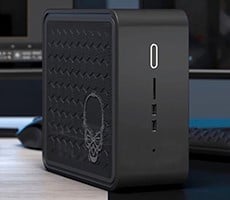We continued our testing with SiSoftware's SANDRA, the System ANalyzer, Diagnostic and Reporting Assistant. We ran four of the built-in subsystem tests (CPU Arithmetic, Multimedia, Memory Bandwidth, Physical Disks).
 |
Preliminary Testing with SiSoft SANDRA
|
Synthetic Benchmarks
|
|

View this comparison as a rough estimate, as some of the system scores were obtained using previous version of SiSoft SANDRA. Technically, you're not supposed to compared scores from different versions -- the reason why we're including them is because we no longer have access to those older systems, and from our experience with this benchmark, the scores aren't totally out of whack when going from one version to the next.
In any event, the takeaway here is, once again, the performance bump compared the previous version. Plain and simple, this year's model is faster, which is something that shows up in benchmarks and subjectively when using the XPS 18 Portable.

What we have here is a good old fashioned beat down. The XPS 18 Portable is the only AIO of the bunch to rock a dedicated SSD, hence the enormous disparity in performance. Specifically, the drive in question is a Toshiba THNSNJ128G8NU 256GB capacity M.2 SSD using Toshiba A19nm MLC NAND flash memory.
Toshiba rates the drive for up 534MB/s sequential read and up to 482MB/s sequential write, though that's underselling it a bit. We fired up ATTO and recorded maximum read and write speeds of 553.04MB/s and 507.67MB/s, respectively. That's zippy, folks.
 |
| Cinebench R11.5 64bit |
| Content Creation Performance |
|
Maxon's Cinebench R11.5 benchmark is based on Maxon's Cinema 4D software used for 3D content creation chores and tests both the CPU and GPU in separate benchmark runs. On the CPU side, Cinebench renders a photorealistic 3D scene by tapping into up to 64 processing threads (CPU) to process more than 300,000 total polygons, while the GPU benchmark measures graphics performance by manipulating nearly 1 million polygons and huge amounts of textures.

Cinebench is one of the most brutal benchmarks, as it's truly intended to measure workstation performance for content creation chores. This time around, we saw a minor performance bump compared to the previous version, though nothing to get overly excited about.

Focusing our attention on OpenGL performance, the XPS 18 Portable puts on a better showing and takes the top rung among systems scoring in the bottom half. Climbing any higher on the chart would require the strength of a discrete GPU.











